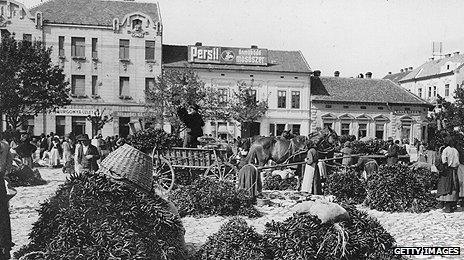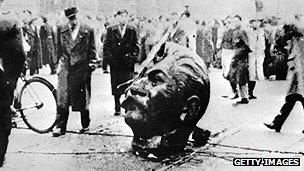Hungary profile - timeline
- Published
A chronology of key events:
9th century - Magyars under Prince Arpad settle Danube plain
1000 - Stephen I, a descendant of Arpad, recognized by Pope as first Christian king of Hungary, expands Hungarian control over Carpathian basin.
1241-1242 - Mongol invasion devastates large parts of Hungary.
1342-1382 - Reign of Louis the Great, who annexes Dalmatia and founds Hungary's first university at Pecs.
1456 - Forces led by Hungarian nobleman Janos Hunyadi defeat Ottoman army at Siege of Belgrade.
1526 - Ottoman Turks defeat forces of Hungarian king at Battle of Mohacs, establishing control over most of the country.
Habsburg rule
1699 - Austrian Habsburgs under Leopold I expel Turks.
1848-49 - Uprising against Habsburg rule under Lajos Kossuth suppressed by military force.

Hungarians trade paprika - a key ingredient of the local diet - in this picture taken in around 1915
1867 - Hungary becomes equal partner in Austro-Hungarian Empire.
Independence restored
1918 - Austro-Hungarian Empire is broken up at the end of World War I. Hungarian republic is proclaimed following a revolution.
1919 - Communists take over power under Bela Kun. Kun wages war on Czechoslovakia and Romania. Romanian forces occupy Budapest and hand power to Admiral Miklos Horthy.
1920 - Under Treaty of Trianon, Entente powers award more than two-thirds of Hungarian territory to Czechoslovakia, Romania and Yugoslavia. The re-defining of Hungary's borders leaves a third of native Hungarian speakers living outside the country.
The National Assembly re-establishes the Kingdom of Hungary, but as the Entente powers had refused to allow the return of a Habsburg king, Admiral Horthy is made regent.
1920s-1930s - Admiral Horthy's rule is characterised by bitter resentment at loss of Hungarian territories, becomes progressively more reactionary and more closely allied with Nazi Germany.
1938 - After Munich Agreement cedes part of Czechoslovakia to Germany, Hungary regains some of the territory it lost in 1920.
1939 - Hungary joins Anti-Comintern Pact of Germany, Japan and Italy, and withdraws from League of Nations.
1940 - With the encouragement of Nazi Germany, Hungary regains northern Transylvania from Romania.
1941 - Germany invades Soviet Union. Hungary allies itself with Germany, and loses a large part of its army on the Eastern Front.
1944 - Hungarian Nazis seize power after Horthy asks advancing Soviet troops for an armistice. Jews and gypsies are deported to death camps.
Communist rule
1945 - Soviet forces drive the Germans out of Hungary by early April. New coalition government introduces land reform bill, redistributing land from large estate owners to peasants.
1947-49 - Communists consolidate power under Soviet occupation, with new constitution, nationalisation of industry, collectivised agriculture and mass terror.
1956 uprising

A statue of the Soviet leader Stalin is toppled during the 1956 national uprising
1956 - Uprising against Soviet domination suppressed by the Soviet Army. Janos Kadar becomes head of government.
1960s - Kadar gradually introduces limited liberalising reforms. Political prisoners and church leaders are freed, farmers and industrial workers given increased rights.
1968 - New Economic Mechanism brings elements of the market to communist state management.
Spearheading change
1988 - Kadar is replaced by Karoly Grosz. Opposition groups form the Hungarian Democratic Forum.
1989 - May - Border with Austria is opened, and thousands of East Germans escape to the West. Communist state in Hungary is dismantled and a transition to a multi-party democracy starts.
1990 - A centre-right coalition wins elections. Hungary withdraws from any participation in Warsaw Pact military exercises.
1991 - Soviet forces withdraw from Hungary. The Warsaw Pact is dissolved.
Democracy
1994 - Former Communists and liberals form coalition following elections. Gyula Horn, the leader of the reform Communists, pledges to pursue free-market policies.
1997 - Referendum endorses joining Nato, which happens in 1999. The European Union decides to open membership talks with Hungary, which begin in 1998.
1998 - Centre-right coalition under Fidesz leader Viktor Orban elected.
2001 June - Parliament backs controversial Status Law entitling Hungarians living in Romania, Slovakia, Ukraine, Serbia, Croatia and Slovenia to a special identity document allowing them to work, study and claim health care in Hungary temporarily.
2002 May - Peter Medgyessy forms new centre-left coalition government in which the Socialist Party partners the liberal Free Democrats.
2003 April - Referendum overwhelmingly approves Hungary's membership of an enlarged EU. However, turnout is only 46%.
Hungary in the EU
2004 May - Hungary is one of 10 new states to join the EU.
2004 September - Former sports minister Ferenc Gyurcsany becomes prime minister following resignation of Peter Medgyessy in row with coalition partner over reshuffle.
2005 June - Parliament chooses opposition-backed Laszlo Solyom as president after Socialists' candidate is blocked by their Free Democrat coalition partners.
2006 April - General election returns Socialist-led coalition under Ferenc Gyurcsany to power.
2006 September-October - Violence erupts as thousands rally in Budapest demanding the resignation of Prime Minister Gyurcsany, after he admitted his government had lied during the election campaign.
Economic woes
2008 March - Government defeated in opposition-sponsored referendum calling for abolition of new fees for health care and higher education.
2008 April - Mr Gyurcsany reshuffles cabinet after Alliance of Free Democrats quits coalition.
2008 October - Hungary is badly hit by the global financial crisis. International Monetary Fund, EU and World Bank grant rescue package worth 20bn euros (£17bn).
2009 March - Hungary and Russia sign deal to build part of the South Stream pipeline across Hungarian territory, although pipeline was eventually halted in 2015. Hungary also agrees to jointly build underground gas storage facility in Hungary, a move which will turn the country into a major hub for Russian gas supplies.
2009 April - Economy Minister Gordon Bajnai takes over as PM; he announces a programme of public spending cuts, tax rises and public wage freezes.
2009 June - Far-right Jobbik party wins three seats in European Parliament elections, gaining almost 15% of the vote.
Rise of the right
2010 April - Conservative opposition party Fidesz wins landslide victory in parliamentary election, gaining two-thirds majority. Jobbik enters parliament for first time, winning 47 seats.
2010 May - Parliament passes law allowing ethnic Hungarians living abroad to apply for Hungarian citizenship. Slovakia threatens to strip anyone who applies for dual nationality of their citizenship.
2010 October - A state of emergency is declared after a torrent of toxic red sludge escapes from a reservoir of chemical waste, killing seven people and injuring 150. Rivers
2011 February - Government agrees to amend media law. European Commission says that the changes meet its concerns over media freedom.
New constitution
2011 April - Parliament approves a new constitution that opponents say threatens democracy by removing checks and balances. The EU expresses concern over the law and asks for it to be withdrawn.
2011 December - Parliament approves controversial new election law that halves the number of MPs and redraws constituency boundaries. Critics object it tilts the system in favour of the governing Fidesz party.
Parliament passes controversial law on central bank reform that gives the government greater control over monetary policy. EU and IMF officials cut short aid talks.
2012 January - Top rate of VAT is increased from 25% to 27% - the highest rate in the EU - as part of a series of austerity measures aimed at curbing the budget deficit.
Tens of thousands of people take part in protests in Budapest as controversial new constitution comes into force.
Credit ratings agency Fitch downgrades Hungary's credit rating to junk status. Two other main ratings agencies already reduced Hungary's rating to junk levels within the previous six weeks.
2012 February - Hungarian state-owned airline Malev goes bankrupt.
EU aid suspended
2012 March - EU suspends aid payments to Hungary because of budget deficit.
2012 April - Hungary makes small changes to the Central Bank law, and the European Commission agrees to resume talks with the IMF on a massive bailout.
2012 May - Veteran Fidesz politician Janos Ader elected president by parliament. His predecessor and fellow Fidesz supporter Pal Schmitt resigned in April after it was revealed that he had plagiarised the works of others in his doctoral thesis.
Standoff with IMF
2012 September - Government rejects conditions attached by the IMF to a new 15bn-euro (£12bn) loan as unacceptable. PM Viktor Orban says the government will present an "alternative negotiation proposal".
2012 November - Jobbik MP Marton Gyongyosi sparks outrage by calling for a list of officials of Jewish origin to be compiled, saying that they could pose a "national security risk".
2013 January - Constitutional court strikes down electoral law amendment approved by parliament in November, saying it restricts voter rights.
2013 March - Parliament approves fourth amendment to 2012 constitution, curbing power of constitutional court.
Economic recovery
2013 June - Government seeks to amend constitution banning political advertisements in independent media and restrictive guidelines on recognition of religious groups, but later waters down proposals under EU pressure.
Hungary emerges from recession, EU EU releases it from excessive deficit procedure mechanism.
2013 September - Parliament approves the latest constitutional changes, despite threat of legal action from the EU.
2013 December - Supreme Court blocks a government attempt to have loans denominated in foreign currencies declared unlawful.
2014 January - The unveiling of plans for a memorial marking the seventieth anniversary of the German occupation in 1944 prompts criticism that the government is seeking to play down Hungary's wartime role as a Nazi ally. Following an international outcry, the plans are put on hold.
2014 February - The government approves a controversial 10bn euro (£8.3bn) deal with Russia over the financing of two new reactors at the Paks nuclear power plant.
Second Fidesz victory
2014 April - Fidesz wins a second sweeping victory in parliamentary elections. International election monitors say that restrictive campaign rules and biased media coverage gave the governing party an unfair advantage.
2014 July - Prime Minister Viktor Orban says that liberal democracy has had its day, and cites Russia, China and Turkey as successful "illiberal" states that he says are worthy of emulation.
2014 August - Mr Orban criticises EU sanctions imposed on Russia over the Ukraine crisis.
2014 September - Hungary's gas pipeline operator says it has suspended delivery of gas to neighbouring Ukraine indefinitely. The move coincides with Russian moves to boost supplies to Hungary.
2014 October - The government drops a proposed tax on internet use which had sparked big protests in Budapest.
2015 February - Thousands protest at visit by Russian President Vladimir Putin on gas supplies to Hungary. EU member states had agreed not to hold bilateral meetings with Mr Putin after Russia's annexation of Crimea.
Migrant crisis
2015 May - EU denounces Hungarian plans for public consultation on immigration, saying proposed questionnaire risks demonising migrants.
2015 September - New law allows arrest of migrants seeking to cross fence on Serbian border, after 200,000 mainly from the Middle East enter the country over the summer in hope of moving on to Germany and elsewhere.
2016 October - Government claims victory after referendum overwhelmingly backs its rejection of EU plans to relocate migrants among member-states, despite low turnout of 40.4%.
2017 May - European Parliament threatens to suspend Hungary from the EU in practical terms over its attempts to close down the liberal Central European University in Budapest.
2017 June - Hungary passes law that requires non-governmental organisations to register as foreign organisations if they receive a certain amount of funding from abroad, in a move seen by opposition supporters as targeting groups critical of the government.
2017 November - Hungarian-born financier George Soros complains about a government campaign involving billboards and leaflets alleging he plans to force EU countries to accept millions of migrants.